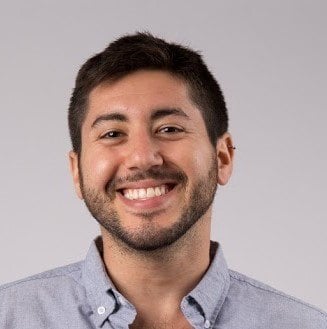
Like so many boys in India, Asim Akhram grew up with a damaging view of what it meant for him to be a man. He remembers his father returning from work, tired and aggravated, and taking his anger out violently towards his mother.
But it was at his grandfather’s funeral, when he was just 13, that he realized something was wrong.
“I looked around: my sister was weeping. My mother was weeping. But I didn’t shed a tear. And this question haunted me every day. Why didn’t I cry? It broadened: Why is society telling me that it’s bad for men to cry?” he says. “When I finally cried, I realized your heart becomes lighter. You shed the pain and agony that you experience. I just didn’t know back then.”
Around this time, Asim’s sister had begun attending workshops held by Talash Society for Inner Strength, Peace & Equality — an AJWS grantee helping young people adopt mindful practices to break out of harmful gender norms. He joined a workshop and was transfixed.
“I immediately saw the society we needed to build,” he says. “And my objective became nothing short of that — creating a society where everyone can seek happiness without discriminating others.”
Established in Kolkata, India, in 2012, Talash addresses an often-unnoticed factor contributing to gender-based violence and early marriage: our own mindsets. With AJWS’s support, Talash founder and director Ayesha Sinha adapted Japanese martial arts, feminist self-defense practices, non-violent communication methods and mindfulness exercises into an intensive curriculum to empower youth in Kolkata to free themselves from the patriarchal power structures that dictate what they can be and achieve.
Below, hear directly from Ayesha, recorded on the rooftop of Talash’s West Bengal office.
Today, Talash works directly with over 5,000 young people in local communities and 58 schools, pushing them to identify what they really want — not what society tells them. Helping boys and young men rewrite the stories they’ve been taught about what makes a man is a key part of Talash’s work.
“Young men and boys experience patriarchy differently than women, but they are also impacted,” says Ayesha. “We are teaching boys that they have a choice beyond toxic masculinity, that they can harness themselves in nonviolence and bring it into their thoughts, self-judgements and guilt.”
The Talash team consists mostly of young people who have graduated from the program themselves, like Asim. This dynamic creates a family-like environment that passes ‘warmth and light’ along to program participants, says Ayesha. From this space of self-acceptance, the real work can begin.
“As each individual transforms and changes, they motivate others to transform. It’s like lighting a candle with the flame of another candle. We’re passing this light from one young person to another, until the light is too bright to look away,” says Ayesha.
Still, Talash is up against major challenges; India’s patriarchal society is deeply ingrained in men and women alike, and transcends class, caste and religion.
“If patriarchy is the very air that I breathe, how can I break it down? It’s all I know. We are helping young people to learn to breathe new air — by creating a new social environment accepting diversity, nonviolence, equity,” says Ayesha.
After attending his first Talash workshop, Asim realized that, like his father, he had been taking his feelings out on others, and his aggression at school was causing other kids to distance themselves. He decided to make a change, and at 14 — in what was a revolutionary act for a son in his community — simply offered to cook his mother dinner.
“Until today, I haven’t experienced happiness so pure,” he laughs.
Now, years after joining a Talash workshop, Asim leads them, creating a new, healthy version of masculinity for more than 20 groups of boys around Kolkata and in his home region of Malda, West Bengal. He’s shifting perceptions of gender roles, early marriage and emotional and mental health.
“There’s a line in a famous Hindi movie: ‘A man never feels any pain.’ But I say, let’s not hide anymore. We hide out of fear of society judging us, and those emotions come out as anger. But the moment you realize you can feel pain, you can realize the pain of others. That’s how we all heal.”

For Ayesha, none of this was a given. She launched Talash over a decade ago knowing she was forging new ground in Indian society. Today, she credits AJWS with more than financial support.
“The most important type of support we received from AJWS is trust. That trust helped us have faith in ourselves. We are attempting to create change in a way that had no blueprint, no map to follow. But AJWS trusted us to follow our hearts. They trusted in our idea: of transforming the minds and behaviors of young people through mindfulness, self-realization,” she says.
“The concepts weren’t concrete back then, but AJWS’s support was. As we developed our plan, we were inspired by your trust. And today, after a long journey together, the impact is concrete as well: lives that are forever changed.”


